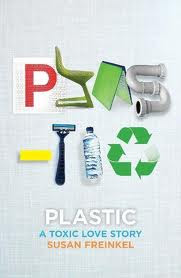Plastic: a toxic love story - book review
I just read a book that I couldn't put down, its called Plastic: a toxic love story. Its about how plastic has became so pervasive in our lives and so dangerous to our health and that of our planet. I've read about this kind of thing before, particularly in "Slow Death by Rubber Ducky", but this new book really explained a few things that hadn't clicked before.
First, plastic is a new thing. I was born in the eighties, so I've grown up with plastic, but only a couple of generations before me, plastic was totally new and people were trying to find new uses for it. While it is true that there are no new elements on earth, there are new combinations of elements and therefore new chemicals, such as plastics, and in fact any petrochemical derived from crude oil, that were not found on earth until humans began producing them using high pressures and temperatures, metallic catalysts and clever conversions. These are chemicals that our body has not evolved to recognise.
Many of these new chemicals look a bit like hormones, so our bodies mistake them for hormones, which disrupts normal processes, these are called endocrine dirupters. This brings me to the second point, conventional poisons theory was "the dose is the poison", this means that any substance is poisonous in high amounts and not poisonous at low levels. For example small amounts of cyanide in apple pips are not toxic, but larger doses can be deadly. Conventional poisons theory does not apply to endocrine disruptors and other new chemicals that our body doesn't recognise. These chemicals can be dangerous even in tiny amounts as they change our biochemical processes (and those of other plants and animals).
Unfortunately for us, all chemicals are still regulated as if it was the dose that mattered, as if there was a safe level of exposure. For many chemicals, the effects on the human body are not really understood anyway, they are just too new, and its just too hard to figure it out what damage an individual chemical can do when we're exposed to so many others. Think of Thalidomide, in the 50s and 60s doctors didn't even realise that chemicals could be transferred from mother to baby! Now that seems obvious, but it just shows how much we don't really know about how the body works. A good rule when you don't know how something works is "don't mess with it", but I think its too late for that.
For now, we need to take some more responsibility for which of these chemicals we are exposed to, as we clearly can't rely on the regulators to tell us which chemicals are safe. Don't assume that just because you can buy something, it won't harm you. For a start, there are too many industrial influences keeping certain substances in use, and then there's just that lack of knowledge of what does cause harm. Regulators are struggling to enforce out-dated regulations, with pressure from industry to leave things as lenient as possible, and it seems that public safety is the least concern. Its up to you to learn more about what substances you should avoid. Its not easy to avoid plastic and petrochemicals, they are now a part of our modern lives, but if you are conscious of the need to avoid them as much as possible, there are some things you can do.
Brace yourself, this won't be easy! It just occurred to me that I'm typing this on a plastic keyboard, surrounded by plastic pens and other plastic stationary, sitting on a plastic computer chair and sitting at a desk made of MDF, which is just wood shavings and plastic resin. There's no way I'm going to rid plastic, or other chemicals, completely from my life, but I can do more to avoid it accumulating in my body:
- Stop storing food in plastic and especially stop heating food in plastic, you're just asking for chemicals to leach into your food. Stop eating and drinking with/from plastic plates, cutlery and cups. Stop using plastic utensils. Stop using cling wrap/film. Stop buying food that's wrapped in plastic (this one is nearly impossible, try buying cheese that's not in plastic!). I don't know what to use to brew beer, our fermenters are plastic and we still vacuum pack our meat in plastic bags. I've been trying to use glass jars more often for storage instead of plastic (10c a jar at the op shop). (see more on Attainable Sustainable).
- Read the labels on all food and cosmetics, anything with numbers or crazy long chemical names should be avoided. Even those sneaky natural flavours may not be so natural. Most food colouring and flavouring have petrochemicals origins.
- New purchases should be as plastic-free as possible, but if its electronic, you may as well give up before you start, at least you can try to buy brand that uses cardboard packing instead of plastic. With furniture try to buy metal or real wood (not MDF).
- Try to use natural fibres for clothing and furnishings, cotton, wool and linen are good choices. Anything synthetic like polyester, nylon, lycra etc is just plastic. Avoid things that are "UV treated", "water resistant" or "stain resistant", that just means more chemicals have been used.
- When decorating, choose carefully, paint and lacquers are available with low VOC (volatile organic content), but as this link explains, that isn't always the best paint for the job. The best advice is to minimise the areas in your house that need painting by considering other materials (difficult unless you're building from scratch).
OK enough of my list, I'm running out of ideas. What changes have you made in your life to reduce exposure to chemicals? and plastics?




.jpg)















Leave a comment